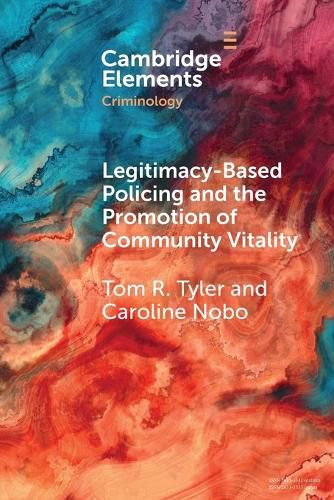Readings Newsletter
Become a Readings Member to make your shopping experience even easier.
Sign in or sign up for free!
You’re not far away from qualifying for FREE standard shipping within Australia
You’ve qualified for FREE standard shipping within Australia
The cart is loading…






This Element presents the history, research, and future potential for an alternative and effective model of policing called 'legitimacy-based policing'. This model is driven by social psychology theory and informed by research findings showing that legitimacy of the police shapes public acceptance of police decisions, willingness to cooperate with the police, and citizen engagement in communities. Police legitimacy is found to be strongly tied to the level of fairness exercised by police authority, i.e. to procedural justice. Taken together these two ideas create an alternative framework for policing that relies upon the policed community's willing acceptance of and cooperation with the law. Studies show that this framework is as effective in lowering crime as the traditional carceral paradigm, an approach that relies on the threat or use of force to motivate compliance. It is also more effective in motivating willing cooperation and in encouraging people to engage in their communities in ways that promote social, economic and political development. We demonstrate that adopting this model benefits police departments and police officers as well as promoting community vitality. This title is also available as Open Access on Cambridge Core.
$9.00 standard shipping within Australia
FREE standard shipping within Australia for orders over $100.00
Express & International shipping calculated at checkout
Stock availability can be subject to change without notice. We recommend calling the shop or contacting our online team to check availability of low stock items. Please see our Shopping Online page for more details.
This Element presents the history, research, and future potential for an alternative and effective model of policing called 'legitimacy-based policing'. This model is driven by social psychology theory and informed by research findings showing that legitimacy of the police shapes public acceptance of police decisions, willingness to cooperate with the police, and citizen engagement in communities. Police legitimacy is found to be strongly tied to the level of fairness exercised by police authority, i.e. to procedural justice. Taken together these two ideas create an alternative framework for policing that relies upon the policed community's willing acceptance of and cooperation with the law. Studies show that this framework is as effective in lowering crime as the traditional carceral paradigm, an approach that relies on the threat or use of force to motivate compliance. It is also more effective in motivating willing cooperation and in encouraging people to engage in their communities in ways that promote social, economic and political development. We demonstrate that adopting this model benefits police departments and police officers as well as promoting community vitality. This title is also available as Open Access on Cambridge Core.